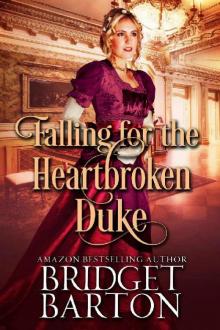- Home
- Bridget Barton
A Baron Worth Loving: A Historical Regency Romance Book Page 5
A Baron Worth Loving: A Historical Regency Romance Book Read online
Page 5
He searched for words, suddenly unsure of his own motives. What was it that he had meant to say? In the end he decided on the truth. “Are you well, Miss Pembroke?”
She answered almost at once, a smile already fitted into place on her face, her eyes looking out and away from him. “I’m always well, Lord Colbourne.”
“Miss Pembroke.”
She turned and looked at him, mild surprise in her eyes, as though she was not often asked for the truth of her feelings. He wondered how often her brothers and family let her laugh off matters without addressing them. He wondered if she knew how much they cared for the truth if she would only give it to them.
“Didn’t you hear what they’re saying inside?” she asked, the smile still on her face although it was slipping a little. “That I’ve country manners and an abrasive nature? The good news is that someone so base and rude couldn’t possibly care what other people thought about them.” She looked back out over the balcony again and shrugged. “I’m sure I’m quite well, Lord Colbourne, if that’s what you came to ask. You may re-join the party.”
Instead, Gerard leaned back against the wall as well and followed her gaze out into the garden where darkness reigned. “It seems like too fine a night to waste indoors,” he said simply. He fell silent then, showing her that he intended to stay, but not asking for any other explanation from her. After a few minutes of silence that seemed to last a lifetime, she turned to him with the smile gone altogether.
“Perhaps,” she said softly, “I am only dreading the carriage ride home tonight, for while it is difficult to face a room full of people that disapprove of you, it is doubly difficult to face that sentiment in one’s parents.” She gave a weak laugh and looked down at her hands. “I suppose Mother will have much to say about the incident and –” she looked up again quite suddenly, her eyes arresting Gerard’s, sad and honest. “And I suppose I cannot blame her. I’ve done badly by the family name tonight.”
She stood then, as though she could not bear the conversation any longer and gave a curtsy. “I thank you for coming out to comfort me. It is a credit to your good nature. But as I see that you will not re-join the revelries while I remain outside, it is only just that I free you by going inside myself.”
She curtsied and, before Gerard could protest, disappeared back indoors. He doubted that she planned to return directly to the ballroom, but he did nothing to stop her and made no attempt to follow her. In truth, he felt very badly about all that had transpired and believed that Nora didn’t deserve the unkindness that had blossomed so suddenly around her.
Chapter 7
Nora walked back out into the hall, leaving Gerard behind her on the balcony. She felt strange, as though he had somehow stepped behind a curtain into an inner, vulnerable place where she had never before invited anyone and didn’t particularly want company. She put a hand to her cheek and tried to catch her breath. It had been a difficult dance anyway, what with the confusion surrounding Robert Marion and the cold shoulders she had been getting from more than one group of people at the party. But something about those few sentences of exchange between her and Gerard on the balcony seemed to overshadow the entire evening.
She was reminded of a time when she was 16 and Gerard had come to their house in the country to visit William. Nora had been nearly giddy with delight upon being invited on a horseback ride with the two men – a thought that made her blush with embarrassment now – and the whole ride she had strained for a chance to join in their conversation.
At the end, however, the most credit she could give to Gerard was that at one point, navigating their way around some large holes in the country road, he had turned around to be sure of her safety. At the time she had considered it the most gallant of all actions, showing a particular concern for her safety. But as she grew older, she’d laughed at that foible, recognising the gesture for what it was – simply a gentleman of honour making certain that a lady in his company was quite safe and well-accounted for.
Now, Nora was firm with herself as she walked away. Gerard’s concern on the balcony was just that – concern – untied in any way to the affection she found herself even now yearning to receive from him. If only he weren’t so dreadfully handsome, so kind, so gentle.
If he were like the other dandies in her life, perhaps handsome, but not at all thinking of the feelings of others, she might be less drawn to him. She walked quickly down the hall now, stopping only when she reached the edge of the ballroom. Her mother was across the room from her but caught sight of her almost at once and beckoned her across the hall.
Nora walked quickly, feeling the eyes of more than a few people fix on her as she went. She wondered what else Robert Manion had told them, what lies and, cringingly, what truth. She knew that her attacker was not above a little embellishment, but she also knew that her free spirit and love of adventure and wit had got her into trouble more times than once. This, however, was different. It was worse. And she was not surprised to see the anger in her mother’s eyes when she neared Mr and Mrs Pembroke’s table. Her father was watching as well, but for the moment he stayed silent.
“Nora,” her mother hissed. “Let me see your dance card.”
Nora pulled the paper out of her reticule but held it in her hands without handing it over. She knew that not a single person had advanced to write their name on her card after the incident with Robert Manion, and she didn’t care to have that fact broadcast in any way.
“There’s nothing of note there,” she said evasively.
“That’s what I’m afraid of.” Fanny Pembroke reached forward and, with deft fingers, snatched the paper from her daughter’s hand and, opening it, examined the inside. “I see that you have done nothing to amend your position this evening,” she said quietly, looking more than a little perturbed.
“Mother,” Nora said, sitting by her parents so that her voice would not carry. “I have not had a chance to relay to you the events of the evening. How can you know for certain what has happened without asking me first?”
“The gossip is, in a position like this, reliable enough.”
“But it’s not the truth.”
“It’s not the truth that matters, Nora,” her mother said, putting a smile on her face as a group of three older women sailed imperiously by. She needn’t have bothered, for Nora noticed that all three women made a point of holding their noses in their air and diverting their attention from the Pembroke table. “It’s what people think the truth is,” Fanny finished quickly. She snapped her fan closed and tossed the dance card aside. “No, as it appears you have no dance obligations to attend to, it seems to me that more harm will come from you staying than if you were to leave now. I will handle the social implications in the morning when people are more composed.”
As much as Nora wanted to resist her mother’s involvement and all the assumptions that were piling out amid her words, in her heart she didn’t want to stay another minute in the ballroom, crowded as it was with preconceptions and conclusions that were both hurtful to her and demeaning to her family.
“I will fetch my cloak,” she said quietly. “And the boys?”
“Your brothers can come home in a separate carriage.” Fanny stood and smoothed the front of her ball gown, taking a great, long-suffering breath and motioning for her husband to follow. “It might do them some good to make an impression of their own here without –” she stopped herself, pretended to busy herself for the moment with her fan, and then finished lamely, “It is of no real matter, I suppose. We will talk of the particulars of the event in the carriage, away from prying ears.”
Nora nodded, feeling a stab of hurt at what her mother’s intentions had clearly been. She had wanted to say that it would be better for Nora’s brothers if her reputation was tied a little less strongly to theirs. She was bringing them down, or at least that was Fanny Pembroke’s opinion. And as much as Nora wanted to fight it, she couldn’t help feeling the same way as she looked across the ballroom and saw Wil
liam laughing with a group of ladies, James talking soberly with a man in the corner, and David dancing another quadrille with a blonde-haired girl from Sussex.
She followed her parents quietly away from the party, put on her cloak over the butter-yellow dress she had felt so lovely in only a few hours before, and let the last magical moments of the ball trail behind her as she walked down the marble staircase and climbed into the seat across from her parents.
Fanny waited until the door was shut and the carriage rolling safely away from listening ears towards home before she brought out her argument in true form.
“Now, Nora. I demand that you tell me everything that happened and how you could possibly have let things get to this point.”
Nora swallowed hard. “Mama, I was speaking to Robert Manion –”
“I believe, considering his position in society, ‘Mr Manion’ would be a more proper address for such a gentleman.”
“I hardly think that was the place where I offended society, mother,” Nora said drily. “I was speaking to him, and I’m afraid I didn’t recognise him at first. I confused him with a friend of his and was making some light banter about this friend – it turned out the joke was rather offensive, and it was about Mr Manion after all.”
“You insulted him to his face?” Fanny sighed and looked out of the window. “I admit that when I first heard whispers of gossip with your name in it, I suspected that it was merely some cruel girl trying to make something out of nothing. But now that you have admitted to my face your wrongdoing, I realise that such a hope was merely clutching at straws.”
“Mother, I overheard some of what Mr Manion was saying myself, and I assure you he was spreading some lies amid the truth.”
“But you should never have given him any truth to run with in the first place,” Fanny said, raising her hands in distress. “What am I going to do with you, Nora? All I’m asking is that you hold your reputation together long enough to get a man – any man – interested enough for marriage. It doesn’t even have to be the man you eventually embrace for life. You simply need to show society that you take these matters seriously and that you’re a serious candidate in the social sphere. We have given you everything that we can aside from a title, and you are doing absolutely nothing with it.”
“Fanny.” Mr Pembroke’s voice came in, gentle but firm. “I believe Nora has her own gifts that she brings to the table, not only the dowry that we offer for her, but also her fine wit and her beauty, for which we have little claim to ownership.”
Nora looked up at her father, grateful for the intervention, but in her heart her mother’s words stung, for the same reason that Robert Manion’s had. For the first time, she felt in them the ring of truth, and she was mortified.
“I should have been more careful,” she said softly, looking down at her hands. “I just got carried away with the evening. It was all so magical.”
“That’s allowable when you’re a fifteen-year-old girl and it’s your first evening out in society,” Fanny said, shaking her head. “But you’re a grown woman now, Nora. You can’t play these games any longer. You are acting like a child, and no man wants to marry a child.”
“How was she to know he would take such offense to matters?” Mr Pembroke said, interjecting himself once again into the conversation.
“Perhaps she could not have known,” Fanny said, her voice softening. She leaned forward and put her hand gently on her daughter’s knee. “But that’s why we tell young women that it is better to stand quietly by, better to go along with the dancing and the compliments and reciprocate as little as possible, for you never know where your intellect will be received well, or where it will offend.”
Nora wanted to respond to this, wanted to tell her mother that her own sons would never be interested in the sort of women who were too afraid to speak their own minds. But at the same time, she was weary and tired. She thought about her best friend and knew that Katherine would have done just that – stand quietly by looking beautiful until her grace and decorum alone wooed some man into asking her to dance. Perhaps if she was more like Katherine, she could have avoided this carriage ride and all the ridicule that had preceded it.
She had always thought in her own mind that she didn’t want marriage to be her sole pre-occupation. But she also knew that it was foolish to act as though she didn’t care about it at all. It was the heartbeat of society and propriety, and Nora knew that if she didn’t find someone to love and cherish, if she didn’t find someone to support her financially and provide an excellent counterpart to her good name, then she would be held back from the things that her family wanted for her, from the things she had to admit she wanted for herself.
“I wonder if I’ve ruined my season,” she said quietly.
“I don’t know what to tell you,” Fanny answered with another sigh. “Perhaps there are people willing to overlook such actions.”
“And by people, you mean men,” Nora said.
“Is that a problem?” Fanny smiled softly. “By people, I mean husband, actually. I hope we can find some way to remedy this little misunderstanding, or you might be right – your season, and your chances of finding a husband in good time, may have been ruined.”
Nora looked out of the window and let the silence fall back into place in the carriage. She wasn’t thinking about Robert Manion, though. She was thinking about a tall gentleman on an empty balcony, sitting so close to her she could hardly breathe. And she wondered if her chances really were over, and what she could ever do to catch the eye of someone like that.
Chapter 8
William Pembroke noticed Nora had left with their parents after the clock struck ten and he went over to claim his dance with her. One of the women told him they had slipped away and left a note at the front of the house, and when William perused the note he saw that arrangements had been made to send the family carriage back for him and his brothers later that evening.
He sighed, worried about Nora. She was a wild thing at times, full of wit and laughter, but he knew from experience that she also had a sensitive side. She cared deeply about people, and the fact that one single event had driven her from the premises with the social equivalent of throwing rotten vegetables at a person would sting even her well-developed courage. He frowned and went back into the room, stopping when he came upon David and James waiting by their parents’ table.
“Did Mother and Father step out for a moment?” James asked.
“No,” William handed over the note, explaining it even before James read it aloud. “They took Nora home, and they are sending the carriage back for us. I think, based on the time at the bottom of the note, that we have another hour at least before the ride returns. Go back to your dancing and your wooing, David.”
David frowned, however, and looked out on the floor of revellers as though it no longer held the same level of magic for him as it had before. “I’m sorry,” he said slowly. “It’s just so unusual for Nora to leave an event before us. She so loves the dancing.”
“Are you blind?” James asked bluntly. “We all know that something went amiss with her and Mr Manion, and so of course Mother and Father would whisk her away to spare us further embarrassment.”
“Embarrassment?” David took a step forward, a flush climbing into his cheeks. “Is that it, James? Are you embarrassed of our own sister?”
James shrugged, keeping his cool as he always did, a bit aloof. “I’m not easily embarrassed, no. But perhaps Mother and Father were making an effort to spare your feelings and support William’s prospects.”
“I don’t need my feelings spared,” David snapped.
“That’s enough, lads.” William stepped between them, pursing his lips together in annoyance. “I hardly think a Pembroke brother brawl will help the situation in any way. People are already lining up to drag our names through the mud. I hardly think it necessary to give them further fodder. Meet outside at the bottom of the stairs to take the Pembroke carriage in an hour’s time. Un
til then, I think it best that you avoid any discussion of Nora’s prospects of the events of tonight. And, David –” he looked at his hot-headed little brother sharply, “– don’t speak with Mr Manion under any circumstances. I cannot imagine that your defence of your sister will make the situation any more bearable, and there’s a high possibility that it could make everything considerably worse.”

 A Lady's Perfect Match: A Historical Regency Romance Book
A Lady's Perfect Match: A Historical Regency Romance Book Falling for the Mysterious Viscount: A Historical Regency Romance Book
Falling for the Mysterious Viscount: A Historical Regency Romance Book Love Stories of Enchanting Ladies: A Historical Regency Romance Collection
Love Stories of Enchanting Ladies: A Historical Regency Romance Collection A Courtship to Remember: A Historical Regency Romance Book
A Courtship to Remember: A Historical Regency Romance Book Longing for a Liberating Love: A Historical Regency Romance Book
Longing for a Liberating Love: A Historical Regency Romance Book Regency Romance Collection
Regency Romance Collection A Baron Worth Loving: A Historical Regency Romance Book
A Baron Worth Loving: A Historical Regency Romance Book Lords to Be Enamored With: A Historical Regency Romance Collection
Lords to Be Enamored With: A Historical Regency Romance Collection A Lady for the Forsaken Earl: A Historical Regency Romance Book
A Lady for the Forsaken Earl: A Historical Regency Romance Book Dukes to Fall in Love With: A Historical Regency Romance Collection
Dukes to Fall in Love With: A Historical Regency Romance Collection The Way to Capture a Marquess's Heart: A Historical Regency Romance Book
The Way to Capture a Marquess's Heart: A Historical Regency Romance Book The Lost Love of a Stunning Lady: A Historical Regency Romance Book
The Lost Love of a Stunning Lady: A Historical Regency Romance Book Once Upon a Dreamy Match: A Historical Regency Romance Book
Once Upon a Dreamy Match: A Historical Regency Romance Book A Charming Lady for the Intriguing Baronet: A Historical Regency Romance Book
A Charming Lady for the Intriguing Baronet: A Historical Regency Romance Book A Governess for the Brooding Duke: A Historical Regency Romance Book
A Governess for the Brooding Duke: A Historical Regency Romance Book Mending the Duke's Heart: A Historical Regency Romance Book
Mending the Duke's Heart: A Historical Regency Romance Book A Bride for the Betrayed Earl
A Bride for the Betrayed Earl A Soulmate for the Heartbroken Duke
A Soulmate for the Heartbroken Duke A Lady for the Brazen Earl: A Historical Regency Romance Book
A Lady for the Brazen Earl: A Historical Regency Romance Book For the Love of a Duchess: A Historical Regency Romance Book
For the Love of a Duchess: A Historical Regency Romance Book A Damsel for the Mysterious Duke: A Historical Regency Romance Book
A Damsel for the Mysterious Duke: A Historical Regency Romance Book The Revenge of the Betrayed Duke: A Historical Regency Romance Book
The Revenge of the Betrayed Duke: A Historical Regency Romance Book A Damsel for the Daring Duke
A Damsel for the Daring Duke Regency Romance Collection: Regency Fire: The Historical Regency Romance Complete Series (Books 1-5)
Regency Romance Collection: Regency Fire: The Historical Regency Romance Complete Series (Books 1-5) A Damsel for the Mysterious Duke_A Historical Regency Romance
A Damsel for the Mysterious Duke_A Historical Regency Romance A Damsel for the Daring Duke_A Historical Regency Romance
A Damsel for the Daring Duke_A Historical Regency Romance Falling for the Heartbroken Duke: A Historical Regency Romance Book
Falling for the Heartbroken Duke: A Historical Regency Romance Book A Soulmate for the Heartbroken Duke: A Historical Regency Romance Book
A Soulmate for the Heartbroken Duke: A Historical Regency Romance Book A Damsel for the Daring Duke: A Historical Regency Romance Book
A Damsel for the Daring Duke: A Historical Regency Romance Book A Soulmate for the Heartbroken Duke_A Historical Regency Romance
A Soulmate for the Heartbroken Duke_A Historical Regency Romance A Damsel for the Mysterious Duke
A Damsel for the Mysterious Duke A Beauty for the Scarred Duke: A Historical Regency Romance Book
A Beauty for the Scarred Duke: A Historical Regency Romance Book Kind Ella and the Charming Duke_A Historical Regency Romance
Kind Ella and the Charming Duke_A Historical Regency Romance Kind Ella and the Charming Duke
Kind Ella and the Charming Duke